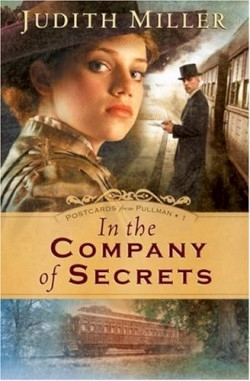In the Company of Secrets
Written in the style of nineteenth-century stories such as Catharine Marie Sedgwick’s New England Tale, this novel has all the elements of the widely read women’s fiction of the 1800s. The heroine Olivia, an orphan, earns her keep as a scullery maid at Lanshire Hall and yearns to become a renowned chef using treasured recipes she inherited from her mother. However, the lecherous master chef of Lanshire Hall makes the cost of her apprenticeship all too clear, and to escape him Olivia is swept away by a scheme concocted by Lady Charlotte, the wayward daughter of the Earl of Lanshire. Lady Charlotte’s plan to track down a disappearing lover who had left his calling card in her womb takes the two women all the way from England to Pullman, Illinois. Once they arrive, Olivia finds that Lady Charlotte lied about a letter of recommendation she had promised to obtain for Olivia from the odious chef of Lanshire. In order to secure employment, Olivia must go against her conscience and accept a reference penned by Lady Charlotte herself.
Though casual about her own lies and deceits, Lady Charlotte finds that the man she chased from London to Pullman is a cad. To avoid ruining “any possibility of a proper marriage,” Lady Charlotte agrees to pose as a widow and to split the cost of the pricey row house Olivia is required to rent from George Pullman. Soon, Olivia has to write a lengthy account of the tales she and Lady Charlotte create to hide Lady Charlotte’s out-of-wedlock pregnancy and Olivia’s “lack of advanced culinary skills.” This account soon fills several pages that both Olivia and Lady Charlotte must commit to memory every evening. Olivia constantly encounters situations where she feels she should come clean, especially at church: “She was certain God had whispered into the ear of the preacher. Why else would he have chosen that particular Sunday to preach about lies and deceits?”
There seems to be nothing deceitful about Pullman, the “celebrated community George Pullman had built for his employees.” In fact, the city soon becomes a character in author Miller’s cautionary tale, and is so vivid that it almost steals the show. However, the author uses just enough historical detail to firmly place the reader in the setting and the story flows effortlessly from the time and place. For example, soon after she arrives, Olivia is shown the marvels of the town built to George Pullman’s specifications: the shopping Arcade, where the glass roof “offered natural illumination during the day and a view of the stars at night,” the stretch of land “Pullman had excavated to create a lake that would collect the condensation water from his Corliss engine,” and “the shade trees that lined the wide macadam streets.” However, Pullman is a company town and around every corner is evidence of the hold George Pullman has on his employees. Residents “have to pay twenty-five cents a month” to use the library and the athletic field sees nearly compulsive use by employees after work hours, for Mr. Pullman “likes his employees to make a good showing at the competitions.” When Olivia admires Pullman for building a town for his workers, she is told that Pullman, Illinois was “erected for two purposes: to make money and to control his employees.” In order to afford the rent for the red brick row houses, many wives of Pullman employees had to work in the company laundry, where “fifteen hundred pounds of soap were made each day, then piped downstairs and delivered to the huge washers, where the dirty items would be restored to snowy white perfection.” Olivia’s friends fear their husbands would lose their jobs if they moved to more affordable residences outside of Pullman.
The precise historical detail, humorous and precarious situations, and engaging characters will keep readers enthralled. The author’s choice to set this tale in a smaller, lesser known community will satisfy those who love obscure historical settings made vibrant. The author even includes recipes in the back of the book that give the reader a taste of Olivia’s cooking. For readers of Christian Inspirational novels, the author’s balance of the deceit of two young women against the broader manipulation of the self-made millionaire Pullman is gratifying. Yet the author challenges readers of this genre. Christian values do prevail on the scale of the individual, yet the broader sweep of dishonorable business practices is left open-ended. Two of Miller’s precious books have won American Christian Fiction Writers Book of the Year Awards. Her love of history (her most recent historical series is Freedom’s Path) shines in this book, which is the first in the “Postcards from Pullman” series.
Reviewed by
Carol Lynn Stewart
Disclosure: This article is not an endorsement, but a review. The publisher of this book provided free copies of the book to have their book reviewed by a professional reviewer. No fee was paid by the publisher for this review. Foreword Reviews only recommends books that we love. Foreword Magazine, Inc. is disclosing this in accordance with the Federal Trade Commission’s 16 CFR, Part 255.

